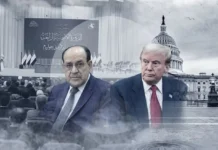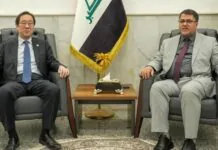Tishwash: Rafidain Bank supports nearly 2,000 projects worth 24 billion dinars.
Rafidain Bank announced the allocation of the 11th installment of the “Leadership and Excellence” initiative, noting that the projects funded by the initiative have reached 1,804.
The bank stated in a statement, seen by Al-Masry, that the initiative (Leadership and Excellence) included the 69th batch of registrations, with a total amount of one billion dinars, within the framework of initiatives supported by the Central Bank of Iraq.
The statement added, “The total number of projects funded under the initiative reached 1,804, with a total value of 23 billion, 941 million Iraqi dinars, reflecting the bank’s commitment to supporting pioneering projects and contributing to the development of the national economy.” link
Tishwash: Kurdish Life in Nashville; A small Kurdistan in the heart of America
Nashville, Tennessee, has been home to a large Kurdish population since the reception of Kurdish refugees in the 1980s. It is known as a small Kurdistan in the heart of the United States.
Two years after the Kurdistan Region of Iraq (KRG) was named the sister city of Nashville, the presence of the Kurdish community in the city has become more pronounced. From Kurdish restaurants and markets to Kurdish festivals, cultural events and sports programs, Nashville has become a symbol of the Kurdish diaspora in the United States.
The “A Country in Our Hearts” podcast, recently broadcast by local radio (WPLN), attempts to make a connection between the past and present of the Kurdish community in Nashville by looking at the stories of Kurdish immigrants. “The choice of this topic reflects the fact that Kurds have been forced to migrate to other countries, especially the United States and Europe, in recent decades, and this idea is the point of contact between the various fronts of Kurdish immigrants who have started a new life in Nashville.
According to Gilbert, a significant part of that history dates back to the 1980s; When the Anfal operations ordered by Saddam Hussein led to the massacre and cleansing of the Kurdish people in northern Iraq, the destruction of thousands of villages and hundreds of thousands of Kurdish refugees. Most Kurdish families, including Nash Chalka, whose father was a Peshmerga, have finally arrived in the United States after years of fleeing and hiding in temporary shelters.
By 2025, refugee housing plans will continue to be suspended and the US political climate will accept fewer immigrants than in the past. This issue has become especially difficult after a massive wave of Kurdish immigrants, especially Kurds from Turkey, across the Mexican border to the United States. Because unlike the first front of Iraqi Kurdish immigrants who entered the United States through organized programs, this new group faces a complex legal process and strict legal and social measures.
This gap between two immigrant experiences shows that Nashville’s “Little Kurdistan” is not just a historical immigrant narrative, but has now become a meeting place of two opposing realities: the memory of displacement in the 1980s and the challenges of asylum in the United States today.
Thus, Kurdish society in Nashvik has been able to establish a stable identity by preserving their traditions and ceremonies. The celebration of Newroz, which has been held in the city since 1994, is a clear example of this cultural resistance. The lighting of the symbolic bonfire and the gathering of thousands of people not only mark the beginning of the New Year, but also a symbol of resistance and hope for a society that has turned its painful history into an opportunity for revival.
In this sense, Nashville’s “Little Kurdistan” is higher than an immigrant neighborhood, and its Kurds reflect the broader challenges of US immigration policy and the role of the diaspora in redefining identities in a new country. The Kurdish experience in Nashville shows how Washington’s political decisions, from Saddam’s Anfal to the restriction of access to refugees, directly affect the fate of displaced people and the future of their fronts in the United States link
************
Tishwash: Digital banks and financial inclusion
Today, Iraq is witnessing the launch of a new era of banking services, shifting toward digital services in line with the global trend toward digitization and the abandonment of traditional services.
This sound approach is not just about smart applications and digital platforms, but rather represents the launch of an ambitious vision for a more comprehensive and efficient financial future.
The traditional banking sector has always been the cornerstone of economies, but for years it has been confined by walls of branches and long bureaucratic wires, which has prevented it from reaching broad segments of society. Obtaining a bank account or a simple loan is an arduous journey, especially in remote areas. Here, the…
The importance of the real revolution of digital banks.
The technology has matured, becoming more secure and safe than ever before thanks to advanced encryption and biometrics. Consumer confidence has matured, as consumers have learned how to manage their daily affairs through their smartphones. More importantly, the urgent need to popularize the concept of the financial citizen, who has the right to save, invest, transfer, and finance with ease and transparency, has matured.
A digital bank, then, is not a luxury, but a strategic necessity. It is the bridge that will allow millions of the “unbanked” to cross into a world of economic opportunity that once seemed out of reach. It is the means by which the small shopkeeper, the woman working from home, the ambitious young man, and the elderly man in a remote village will be brought under the umbrella of the formal financial system. These are not just transactions; they are true empowerment.
Hence the importance of digital banks in achieving financial inclusion.
Digital banks are distinguished by their absence of the huge operating costs of traditional branches. Digital banks can offer their services at highly competitive prices, lower fees, and higher returns on savings, benefiting all customers, especially those with limited income.
The launch of these banks is a clear message of confidence in our economy, our technological capabilities, and our future. It is a declaration that we believe in all our citizens and strive to provide every individual with the tools they need to be an effective part of the economic fabric.
This is not the end of banking as we know it. Rather, it is a new birth—smarter, faster, and closer to the pulse of the people. The financial future begins today, with the push of a button, the touch of a screen. Let us all be the ones who make it happen.
Today comes the Central Bank’s step
The launch of e-wallets is a fundamental prerequisite and an important path to launching digital banks in Iraq. This approach forms part of a broader strategy for digital transformation in the Iraqi banking and financial sector. This step—and I mean the launch of the e-wallet—can be considered
Preparing the digital infrastructure and developing the payment and financial transfer system in Iraq. These wallets serve as a technical and operational foundation for building integrated digital banking services.
• By enabling transfers between e-wallets and merchants, the Central Bank facilitates the transition to cashless transactions, a necessary step for digital banks that rely entirely on electronic services. This will contribute to enhancing digital financial literacy.
Having secure e-wallet systems in place also makes it easier for future digital banks to comply with regulatory standards without having to build systems from scratch.
All these efforts coincide with the banking sector reform plan launched by the Central Bank, which focuses on enhancing financial inclusion and digital transformation. link





